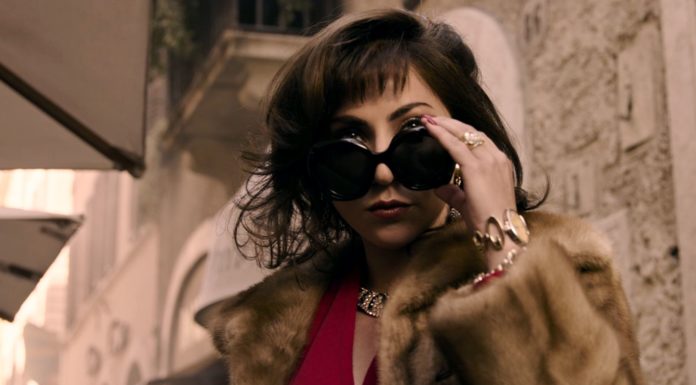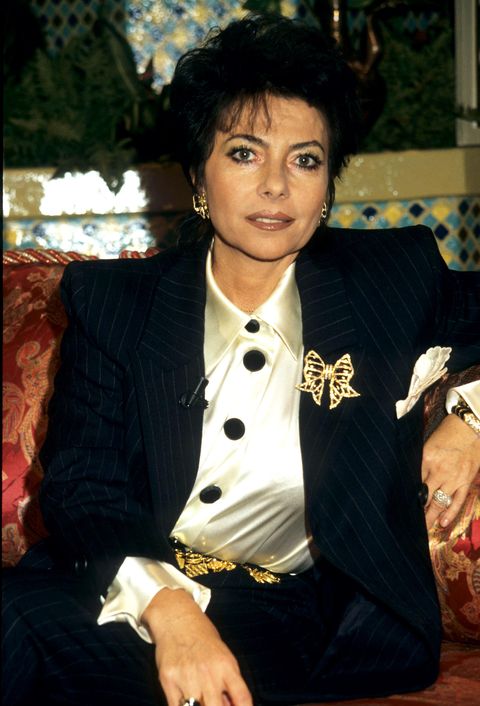When House of Gucci opens in cinemas this month, it is expected to become a true fashion Hollywood blockbuster. A story about greed, family, passion and murder, Ridley Scott’s movie focuses on the real-life story of Patrizia Reggiani, an Italian socialite played by Lady Gaga, who married Gucci heir Maurizio Gucci, portrayed by Adam Driver. Initially, they were happy together, using their soaring wealth to buy houses around the world, a super yacht and even a chauffeur-driven car with the personalised registration plate ‘Maurizia’. Patrizia herself developed a taste for luxury fashion, oscillating between head-to-toe Chanel and Gucci. She famously said, “I would rather weep in a Rolls Royce than be unhappy on a bicycle.”
Unfortunately, their relationship went south and the couple split up. In 1991, Maurizio Gucci filed for divorce and started dating another woman. He also sold his remaining stake in the Gucci brand. Patrizia flew into a rage, worried about what her ex’s new relationship and mad spending would mean for her alimony. So, she hired a hitman and had Maurizio fatally shot. Her crime didn’t go unpunished – she was sent to prison for 29 years (serving 18 for good behaviour). She still claims innocence, alleging that her clairvoyant arranged Maurizio’s murder for her as a gift, but that’s not to say she shows much remorse for what happened. Not long after her prison release, she was asked by a reporter why she hadn’t killed her ex-husband herself. “My eyesight is not so good,” she replied. “I didn’t want to miss.” It’s reported that Lady Gaga stayed in character for 18 months, as she learnt to perfect Patrizia’s Italian accent and mannerisms.
It’s not hard to see why Ridley Scott and his star cast, which also includes Adam Driver, Al Pacino and Salma Hayek, were drawn to the scandal. The director was inspired, however, by Sara Gay Forden’s meticulously researched book, House of Gucci, which documents – not just the murder of Maurizio – but also the Succession-style feuding of the Gucci family. One board meeting famously ended with bloodshed after an argument turned violent, while another bitter fight resulted in one of the cousins betraying his own father to the IRS, causing his eventual imprisonment.
No one knows the story better than Forden, who was working in Milan as a seasoned fashion business reporter when Maurizio was murdered on 27 March 1985. In addition to already having met and interviewed the Gucci businessman and Patrizia, she spoke to more than 100 people close to the family over the course of 18 months to create an accurate and detailed account of what really happened. She was brought in to collaborate on the screenplay, which she describes as “a dream come true”, and is soon to release a movie tie-in version of her original tome. We talked to her to find out how she wrote a book that inspired a blockbuster movie, why she thinks Patrizia was moved to murder, and what drove the Guccis to ruthlessly turn on one another.
What drew you to the Gucci dynasty?
“I have always wanted to write a book. I’m a journalist and I deal in facts, so I knew it would be non-fiction – I just didn’t have a feel for what it would be about. One day I was in a public library doing some research and I typed in ‘Gucci’. Of the 10 links that appeared, eight had been written by me and that’s when a lightbulb went off in my head. It was such a sad story – Maurizio was forced out of the company, then he was killed and his wife arrested for his murder – and I didn’t have the heart to write about it. I felt there was more of a narrative shape when the company started taking off again and I realised I could tell the story of a rise and fall and then a rise again. Although Maurizio wasn’t there to see it happen, he had been the one with the vision; he’d changed the game – the connector to the past and future.”
Who was the most helpful in understanding the story?
“One of the most helpful was Domenico de Sole, who had the longest arc of experience with the narrative. He started as Rodolfo Gucci’s lawyer when the family battles were starting. He was in all the family board meetings, even the more famous ones, including the time that Paolo Gucci – the grandson of the Gucci founder – was injured by another family member after being hit with tape recorder. Domenico ended up becoming the luxury CEO who turns Gucci around and takes it into the future as a multi-brand group. I also spoke a lot with Dawn Mello and Tom Ford.”
“Although a lot of the protagonists were dead – or, in Patrizia’s case, in jail and not permitted to talk to me – I was able to get very close to them through other people. I became very close to Maurizio’s secretary, who also went on to work for Patrizia and the girls. His driver, Luigi, was very helpful and someone who was with him all the time. As a good journalist, you learn that it’s the little people – the hidden or the quieter people – who are actually the most important sources.”
Why did the Guccis become so cutthroat towards one another?
“It was a case where blood was not thicker than water. There were high stakes and, ultimately, ambition and greed drove them apart rather than bringing them together. There were repeated betrayals among the family that completely eroded any trust and ability to work together towards a common goal.”
You were in Milan the day Maurizio was murdered – what are your recollections?
“It was so shocking. It was early, around 8.30am, and I was leaving my apartment to go to work when one of my reporters called and said, ‘Sarah, Maurizio Gucci’s been shot.’ I ran to our bureau which was round the corner from the crime scene – when I got there it had already been cordoned off, there were police officers everywhere. The place was swarming, so I couldn’t get close to it. There was a very sinister sense of the unknown because no one knew who could have done such a thing. No one knew until two years later that it was Patrizia. The magistrate investigating the murder was looking into business deals, so there was a sense that it was a Mafia or gambling debt that had turned ugly. It wasn’t evident that it was a crime of passion.”
Why do you think it took two years to arrest Patrizia, especially given that she told numerous people that she wanted Maurizio dead?
“The investigating magistrate fancied himself an investigator of economic and financial crimes, so that’s where his mind was. They were tapping Patrizia’s phone, but she and Pina [her clairvoyant who was also charged with arranging his murder] were talking in code about the money that she still owed the killers. There were talking about refurnishing the apartment and meters of fabric as a metaphor for the lira owed, so investigators didn’t pick it up.”
This content is imported from Instagram. You may be able to find the same content in another format, or you may be able to find more information, at their web site.
Having met Patrizia, how would you describe her as a person?
“She was the most complex out of the two of them. Maurizio was compelling to me because of his role in the family, but Patrizia was such a combination of different things. I do believe that she loved him in the early years and that they were happy together, but the unravelling of their relationship and her growing obsessive hatred of him that could drive her to do such a final thing was, I don’t want to say intriguing, but it’s difficult to understand. I wanted to be careful in the way I portrayed her in the book because although they called her the Black Widow in the press, she was – as the Italians would say – ‘chiara e scuro’ – the light and dark.
“She was very much a creature of her upbringing. She was born out of wedlock to her mother in central Italy and the mother was very socially ambitious and ended up marrying a wealthy man, but he wasn’t part of the Milanese industrial elite. She pushed Patrizia not only to marry well, but to marry a big name. Patrizia was very clever, sharp witted, funny and also very protective of her daughters. During the trial, the court ordered an in-depth psychological evaluation of her and she was diagnosed with narcissistic personality disorder. When someone has that kind of psychology, everything that happens is felt as a blow against them personally, so for Patrizia – who was so invested in the Gucci name and company – when Maurizio lost control, she experienced that as something he had done against her. She took his struggles personally, and that cemented her anger and rage. There are people who said she was evil, but I don’t think she was – it’s more complex.”
Why do you think she did what she did?
“I think she did it in part to protect her daughters. She could see Maurizio was spending money in a way that was out of control and she was afraid that once he’d sold his stake, that money was finite and it would dry up. The judge summed it up really well when he issued her sentence. He described how invested Patrizia was in the name and being part of the Gucci empire; he said that Maurizio died not for who he was, but what he had.”
After having researched her extensively, what surprised you the most about Patrizia?
“In subsequent interviews after prison, she described a certain nostalgia for her time in jail. I thought that was interesting; here was a woman who had lived in the heights of luxury, but she was very much alone – she was an outsider in that Milanese elite society. She had her mother who was always critical of her. She felt some humanity in jail that maybe she hadn’t had in her former life.”
Do you know much about Patrizia’s situation now?
“She lives in Milan behind the courthouse where she was convicted in her late mother’s house. She’s often seen in Milan and being transported around by her driver. Sometimes the paparazzi stop her and ask her questions, so there are sightings.”
How do you feel about the film?
“I am so hugely gratified that Ridley Scott and his team found this narrative interesting and have used my book. I consulted on the screenplay which was a wonderful experience and it captures the spirit of the story. I’m over the moon, I couldn’t have dreamt it. The casting is phenomenal. Lady Gaga is perfect as Patrizia – talk about wit, spirit and style. She’s petite like Patrizia and sexy and glamorous. She’s got all of it.”
What do think there are moral lessons to be learnt from the Gucci story?
“Be kind. We’re in such difficult times, and to me this is an epic family story that shows the tragedy of not trying to work together and allowing greed to take over. It’s a warning about not remaining grounded. But to me, it’s not just about the murder, but also a story about Italian fashion, the craftsmanship and dedication to quality and making things special. In this era of everything being fast, it shows the importance of slowing down and appreciating the good things we have.”
How has Gucci managed to overcome its tragic past to become a powerhouse?
“There’s this mystique about Gucci even today, something inexplicable about it. Everything has come together – when I interviewed Maurizio he refused to talk about the past because he was so embarrassed by the family fights that wanted to put a lid on it, but his PR woman used to say, ‘Maurizio you can’t pretend the past didn’t happen, you have to find a way to deal with it.’ Now, you have this Gucci that has reconnected to its past; Alessandro Michele references the icons, the GGs, the bags, the riding imagery and even the Savoy where founder Guccio Gucci worked as bell boy, while keeping it in the popular zeitgeist. It’s refreshed, renewed and so cool. Young people love it, the movie is coming out so people will know about the story behind the brand told in a dramatic, compelling way, and it’s the 100th anniversary. How do you explain all those things coming together?”
What do you think Maurizio would think of what Gucci has become today?
“Maurizio wanted Gucci to be classic and elegant. He used to say it should be ‘round and brown and soft to a woman’s hand’. He envisioned it as the Italian Hermès. That said, I think he’d be thrilled with the success and vibrancy of the brand today.”
The House of Gucci [Movie Tie-In] by Sara Gay Forden is published by Custom House, RRP £8.99
This content is created and maintained by a third party, and imported onto this page to help users provide their email addresses. You may be able to find more information about this and similar content at piano.io














